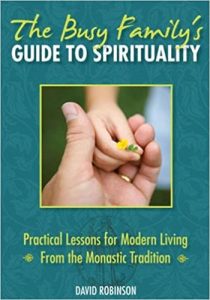The Busy Family’s Guide to Spirituality
 “The way into family spirituality unfolds gradually, step by step,” David Robinson writes in “The Busy Family’s Guide to Spirituality.”
“The way into family spirituality unfolds gradually, step by step,” David Robinson writes in “The Busy Family’s Guide to Spirituality.”
Encouraging each family member “to grow in faith, hope and love” is the goal of parenting, he believes. He acknowledges that achieving this goal takes time and commitment for the long term.
“Every healthy family has problems. Every troubled family has strengths,” Robinson observes. Moreover, “every child is different,” and “every season of parenting is different.” There are, then, “no cookie-cutter molds in raising a healthy family.”
The author clearly devoted his sharpest powers of reflection over a lengthy period of time to the meaning of parenthood and family spirituality. Yet, I think readers will identify readily with him when, early on, he writes:
As a father I live too often in the shadow of regret, fear and weariness, and not enough in the light of gratitude, faith and love. A slogan that often describes my life is, ‘Why pray when I can worry?’”
Robinson and his wife raised three sons. He is pastor of a Presbyterian Church in Oregon, and in 2006 he became a Benedictine oblate of Mount Angel Abbey in that state. This book is a revised edition of “The Family Cloister: Benedictine Wisdom for the Home,” a book Robinson published in 2000.
The Wisdom of St. Benedict
In his guide to family spirituality, Robinson draws upon the ancient Rule of St. Benedict and its guidelines for monastic families. “I believe Benedict has wisdom and guidance to offer the 21st-century family, Robinson says.
Monks know, he notes, “that life together is always a work in progress.” It was St. Benedict’s assumption “that people will make mistakes,” but the great saint also expected mistakes to “be dealt with in a wise and loving manner,” Robinson says.
In discussing conflict in home life, the author advises parents that “the work of waging peace in a family can be like resetting broken bones.” However, he adds, “when we trust God to mend our broken lives, we open the door for wholeness to enter our family once again.”
Robinson’s book is “for busy parents seeking a way to practice family spirituality with children in the home.” A central truth of family spirituality, he stresses, “is that people matter more than things.”
The Practicalities of Family Life
Because spirituality for a family and the practicalities of daily family life intertwine so tightly, readers will find that this book covers both the workings of ordinary family life and the place of God in a family. It is difficult to imagine the interested parent who would not find something of value in these pages.
Robinson finds time and space to examine the balancing in family life of work, quiet time and play. He accents respect (and respectful language) among family members, and he finds that both accountability and forgiveness are of the essence in home life.
The topics covered in Robinson’s guide range from discipline and rules to “how parents can coach their families with the goal of becoming a healthy, spiritual team.”
Family meetings, spiritual guidance for children, simple prayers and psalms for families, service to others outside the home and the challenge of dealing with difficult tasks – all these are treated in the book.
Speaking of the difficult tasks that at times must be dealt with in family life, Robinson states pointedly, “Not all that happens to us for our good feels good.”
The purposes of family meals are of real interest to Robinson. He finds that “eating together provides an opportunity to clearly see the blessings in our midst.” Indeed, he writes, meals “are a daily opportunity to nourish the soul of the family.”
The author’s conviction is that “we feed the family as much by what fills our spirit as we do by what fills our bowls and platters.”
Robinson offers countless brief suggestions and bits of advice, along with practical aids to help parents deal with key concerns.
I enjoyed, for example, a survey designed to help parents assess the current state of their family life in key areas such as the amount of time spent reading aloud together, the number of hours of TV viewing in their home, quality time spent with children, family meals and other matters.
Another tool is designed for those wanting to do better when it comes to distinguishing “needs” from mere “wants.”
If you ever visited a Benedictine monastery, you are sure to have experienced a bit of the hospitality called for by the Rule of St. Benedict. Because of its importance in Benedictine life, you would expect Robinson to incorporate a spirit of welcome into the workings of family life, and he does.
He comments: “The more space we make for God in our hearts, the greater capacity we have to welcome others into our lives.”
About the reviewer
David Gibson is a longtime, now retired, member of the Catholic News Service staff.
Disclaimer: Book reviews do not imply and are not to be used as official endorsement by the USCCB of the work or those associated with the work. Book reviews are solely intended as a resource regarding publications that might be of interest to For Your Marriage visitors.




